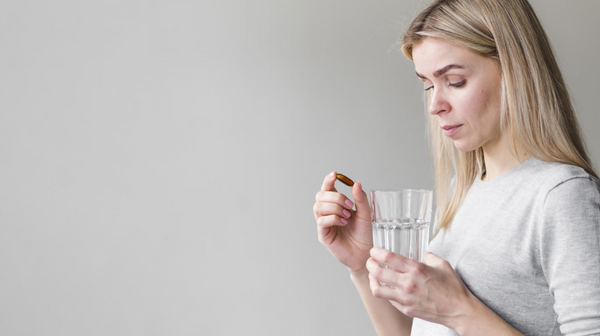Gamma-aminobutyric acid, or GABA, is an amino acid that occurs naturally in our body. It acts as a neurotransmitter or chemical messenger to our brain. Messages travel through the nervous system via neurons, which send signals to one another. For instance, they could transmit a warning about a hot pan from your hand to your brain or a message instructing you to move away from danger. They could also transmit information among nerve cells in the nervous system.
GABA acts as an inhibitory neurotransmitter, blocking or inhibiting certain nerve transmissions and decreasing neuronal stimulation. This means that if a neuron receives a message along the way and does not act on it, the message is not forwarded to other neurons. It plays a major role in controlling nerve cell hyperactivity.
Gamma-aminobutyric acid attaches to the GABA receptors in your brain and gives your mind and body a calming effect. This helps in eliminating the feelings of anxiety, stress, and fear, and may also further help in preventing seizures. Due to the soothing effects that it has on your body, GABA has lately become a very popular ingredient in supplements.
What is GABA Used for?
Too much stress is the leading cause of poor sleep and a weakened immune system. It is also linked with depression and other mental and physical ailments. If the functioning of GABAergic neurons is disrupted, it can have an impact on mental health and contribute to a variety of psychiatric and neurologic disorders (disorders of the brain and nervous system), some of which include:
● Seizures
● Parkinson’s disease
● Anxiety
● Panic attacks and disorders
● Depression, and
● ADHD
Benefits of GABA
By now we’ve established the fact that GABA has a calming effect on the brain and also plays a role in physical health, but let’s go into detail.
- Reduces Anxiety
GABA attaches to a protein called the GABA receptor in your brain and produces a calming effect on your body. It helps in relieving stress, anxiety, and fatigue. In cases of social anxiety, the neurons fire signals that cause feelings of anxiousness in a crowded social setting or when meeting someone new. GABA works to calm the brain and slow the central nervous system, which can help to reduce anxiety signals and make you feel more at ease in social situations.
In certain cases, it has also been shown to be helpful in preventing seizures. Due to all of these amazing effects that GABA has on the body, it has become one of the most widely sold and consumed supplements in recent years.
- Treats Insomnia
Sleep deprivation has been linked to low GABA levels. According to the findings of one study, taking GABA-enriched supplements may promote sleepiness by influencing early sleep stages. Another advantage is that it will not make you drowsy the next morning, as other over-the-counter medications do.
- Helps with Blood Pressure
According to certain studies, GABA may help lower blood pressure levels in the body. Its therapeutic effects on the body also help in slowing down the heart rate, thereby preventing the risk of cardiovascular ailments and hypertension-related problems.
How Can I Get GABA Naturally?
There are GABA supplements available, but there are also natural ways to increase GABA levels in the brain. Here are several examples:
● Exercising: Frequent exercise has been found to boost GABA levels in the brain. Most days of the week, aim for at least 30 minutes of moderate-intensity activity, such as brisk walking or cycling.
● Meditation and yoga: Studies have indicated that practices such as meditation and yoga boost GABA levels in the brain and induce relaxation. Incorporate some of these practices into your regular routine.
● Sleep: Adequate sleep is essential for overall brain health and can help manage GABA levels. Strive for at least 7-8 hours of sleep per night.
● Taking Probiotics: Some strains of probiotics may increase GABA production in the stomach, which may have a good influence on GABA levels in the brain. Include probiotic-rich items in your diet, such as yogurt or kefir.
● Consume Green Tea: Green tea contains the amino acid theanine, which has been demonstrated to enhance GABA levels in the brain and promote calm. Include green tea in your regular regimen.
● Foods Rich in Glutamate: Glutamate is a precursor to GABA, so eating glutamate-rich foods, such as whole grains and nuts, may help sustain healthy GABA levels in the brain.
When to Seek Help?
Because GABA levels in the brain cannot be readily measured, detecting low GABA levels can be problematic. However, if you are experiencing symptoms such as anxiety, insomnia, or other mental health concerns, it may be worthwhile to consult with a healthcare expert to evaluate the underlying cause and the best course of action. They can assess whether low GABA levels are causing your symptoms and offer appropriate treatment choices, which may include therapy, medication, or other interventions. Before contemplating supplements, it is best to try natural strategies to increase GABA levels, including exercise, meditation, and sleep.
Wrapping Up
GABA, thus, plays an important role in our bodies. It helps regulate stress, anxiety, insomnia, and blood pressure for us and thereby keeps us healthy and fit. Having said that, we advise you to consult with a doctor or medical practitioner before you add any GABA supplements to your diet - especially if you suffer from any chronic conditions or are pregnant or breastfeeding.
Reference Links
https://www.ncbi.nlm.nih.gov/pmc/articles/PMC6696076/
https://www.ncbi.nlm.nih.gov/pmc/articles/PMC3111147/


























